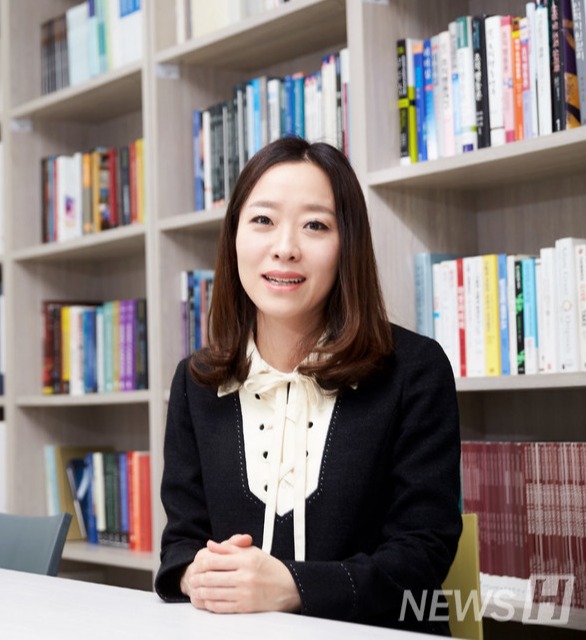Professor Shin Yu-hyung, Division of Business Administration, selected as one of the world’s top 2% researchers
A life in organizational behavior research guided by Samjeong(the Three Virtues) of positivity, compassion, and passion
Professor Shin Yu-hyung from the Division of Business Administration at Hanyang University, has been recognized as one of the world’s top 2% researchers by Elsevier, a leading information analytics company. Released last September, the world’s top 2% researcher list by Elsevier identifies scholars who possess global research competitiveness. The number of world’s top 2% researchers at an institution represents its international competence in research, and Hanyang University had 102 faculty members featured on the list.
Professor Shin has conducted extensive research on organizational behavior, including the attitudes and psychology of members in an organization. Recently, she has contributed to sustainable organizational culture through studies on ‘job crafting’ and ‘leader phobia.’ The following is an overview of his research journey and vision.

Could you give us a brief introduction of yourself?
“I am Professor Shin Yu-hyung of the Division of Business Administration, and I have taught organizational behavior at Hanyang University for 15 years since 2010. Since July, I have also served as Director of the Baeknam Academic Library, putting efforts into enhancing facilities and services.”
Which topic or idea are you currently concentrating your research on?
Currently, I am focusing on the study of the psychology of organizational members, with special interest in ‘job crafting.’
Job crafting refers to proactively changing the content or difficulty of one’s work in line with personal aptitude, strengths, and passions. Key aspects include reshaping tasks and reconstructing the meaning of one’s work.
For instance, think of a Disneyland janitor not just as someone who picks up trash, but as someone who contributes to making Disneyland a magnificent place, enhancing the sense of meaning and dedication for the job. To be specific, I am investigating what organizational elements encourage such proactive behaviors.
What was the motivation behind choosing this topic as your primary research field?
I grew my interest in job crafting because I personally experienced that the more I practiced job crafting in my job as a professor, the more enjoyable my work became. The job of a professor involves diverse tasks including teaching, research, and administrative tasks. Among these, I practiced job crafting by expanding the area of research, which best suited my aptitudes, and by investing relatively more time and energy into research.
Another job crafting practice I engaged in was organizing seminars for graduate students during vacation to support the development and progress of their research ideas. These seminars led to successful journal publications for my graduate students.
How do you feel about being selected as an Elsevier top 2% researcher?
Being selected as an Elsevier top 2% researcher is the highest honor for a scholar. Considering that top researchers are mostly concentrated in the fields of science and medicine, it is truly rewarding and delightful to have entered the top 2% as a humanities and social sciences professor. I feel a great sense of pride in my contribution to enhancing Hanyang University’s research competitiveness.
Among all the achievements you have made so far, which one is the most meaningful to you?
The achievement that stands out most to myself is a paper published in the Journal of Management in 2017. This research analyzed how the fit between the risk-averse and risk-seeking tendencies of leaders and subordinates influences work efficiency. I co-authored it with Vice President Kim Min-su and two Ph.D. students.
Because it was published in a top journal, it had to go through four rounds of revisions in total. Getting the paper passed each stage was tough, and when I received the e-mail confirming its publication, I was so happy I teared up. I especially remember the moment our research team celebrated the achievement with champagne. In the fields of humanities and social sciences, it is extremely hard for graduate students to publish in top international journals, so achieving this together was even more meaningful.

If there is an achievement with significant potential for industrial application, please describe it for us.
Since my research focuses on organizational behavior, there are aspects that can be applied to HR management and organizational culture in businesses. Just as research in the U.S. shows increased corporate performance through job crafting, my research can help Korean companies implement education or workshops for employees to practice job crafting.
Recently, the turnover rate among the MZ generation has increased. I believe that, beyond compensation and benefits, encouraging young employees to engage in job crafting can foster greater work immersion and a sense of ownership, helping to reduce the turnover rate.
What would be the fundamental attitude you consider important as a researcher?
The three virtues I always emphasize to my students—positivity, compassion, and passion—are applied equally to research. First, no matter how difficult and stressful the research process may be, maintaining a positive attitude eventually leads to finishing the process. Second, most research is a process generating synergy through collaboration, so I strive to practice compassion by considering others and distributing resources and achievements fairly.
Finally, I value enjoying research with pure passion. I believe those who enjoy the work cannot be surpassed even by those with the greatest intellect. If you do not enjoy the process of coming up with ideas, testing them, and writing up results, it can be very challenging to produce research outcomes. That is why passion for research is crucial. Positivity, compassion, and passion are also elements of job crafting.
Are there any future goals or research topics you hope to explore?
My current interest on future research topics is on “leader phobia” among the MZ generations. As workload and responsibility increase with promotion to management positions, more young professionals are hesitant to take on such leading roles. I was selected for the Korean Research Foundation’s mid-career researcher support project this year for this topic. I plan to conduct studies on the causes and solutions for leader phobia.
Also, although I have been a full professor for over eight years, I still have great passion for research. I hope to keep this flame of passion alive until I retire.
관련기사
- ASML Laboratory Produces Six Doctoral Scholarship Students for Samsung Electronics MX Division At Once
- HYU Future Innovation Tourism Lab Wins Best Paper Award at 2025 APTA Conference
- HYU POSCO Bubble Shield Team Wins Grand Prize at POSCO Group’s ‘Sustainability Level-Up Ground’
- “Eight Attempts, Finally the Top Score” — Moon Ji-hwan Receives Minister of Science and ICT Award as Top University Performer in TOPCIT
- A Warmhearted 1,000-Won Breakfast Table at HYU
- HYU HESA Team Wins Grand Prize at Lotte GRS Industry-Academia Project with Brand ‘Samrak’
- Professor Roh Tae-woo, Architect of Sustainable Environmental Management, Named Among Top 2% Researchers in the World
- The Fusion of Engineering and Medicine: Leading Medical Innovation by Professor Jeon, a Top 2% Researcher
- Professor Kim Dong-won, the Top 2% Researcher Leading the Future of K-Batteries
- 107 Faculty Members Named Among 'The World’s Top 2% Scientists' from HYU, Proven Excellence in Research


 '한양위키' 키워드 보기
'한양위키' 키워드 보기